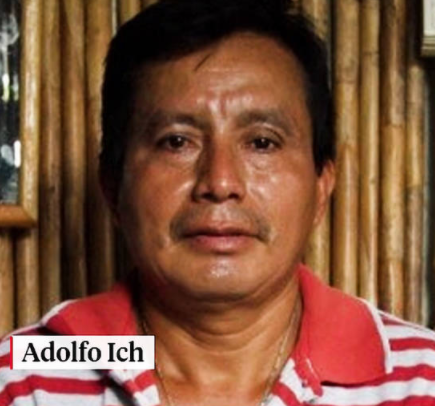Article by PBI-Canada

On January 8, the Peace Brigades International-Guatemala Project posted on their Facebook page a Toronto Star article that reports: “On Wednesday [January 6], the former head of security for a subsidiary of the Toronto-based mining company Hudbay Minerals officially pled guilty in a Guatemalan court to killing a local Indigenous community leader and paralyzing another Indigenous man [in September 2009].”
“Mynor Padilla, the former security chief of CGN, a Guatemalan nickel-mining company that was owned by Hudbay between 2008 and 2011, pled guilty to the crimes … as part of an agreement struck between Padilla and his victims, among them Angelica Choc, the widow of slain community leader Adolfo Ich, and German Chub, who was paralyzed.”
The Guardian has reported: “The nickel mine had previously operated [from 1960 to 1980] under other Canadian ownership [Toronto-based Inco Ltd.] during the country’s 1960–96 civil war… Corporate land and mining rights acquired under military rule sparked decades of conflict and opposition from local Indigenous communities.”
In 2004, Vancouver-based Skye Resources (later bought by Hudbay Minerals in August 2008) acquired the rights to the mine and sought to revive it in the predominantly Maya Q’eqchi’ region outside the town of El Estor in the department of Izabal.
Significantly, The Intercept has reported: “The Canadian embassy in Guatemala had lent Skye a helping hand.”
That article then quotes an email from a counselor from the Canadian embassy who wrote in December 2004: “After months of negotiation, during which the Embassy played a strong supportive role, the Guatemalan Ministry of Energy and Mines has issued a 3 year exploration licence to Skye Resources.”
Dawn Paley has reported: “In mid-September 2006, after years of living five or more families to a lot in the overcrowded town of Chichipate — located just west of El Estor — six groups comprising more than 400 families moved onto [those] lands…”
The Intercept adds: “They argued that they were reclaiming lands that [Toronto-based] INCO had stolen from them over 40 years ago [when the mine first began operating]. Over the next two months, these groups grew to nearly 1,000 families.”
That article further notes how Skye Resources/CGN then engaged in tactics to dispossess at least 19 Maya Q’eqchi’ communities from these lands.
It reports: “The campaign culminated in two waves of evictions targeting several Indigenous villages on January 8, 9, and 17, 2007. Eleven women from Lote Ocho were allegedly gang-raped by police officers, soldiers, and CGN’s security during the last eviction.”
Padilla shot and killed Ich in September 2009.
In 2017, CTV reported: “Padilla, a former ranking member of the Guatemalan military [a lieutenant colonel in the army], was arrested almost three years after Ich’s death even though a warrant for his arrest was issued soon after. He remained on the payroll of Hudbay’s Guatemalan subsidiary until he was taken into custody but it would take another three years to stand trial, which lasted a further two years.”
Padilla was acquitted by a Guatemalan court at that time.
Now, Padilla will be formally sentenced on January 13 but does not face jail time. His sentence of 20 months has already been commuted to fines.
Guatemalan human rights lawyer Ramon Cadena says: “[This] is a reflection of the impunity in Guatemala.”
There are currently two ongoing lawsuits in Ontario including one launched by Ich’s widow and Chub in 2010 that alleges Hudbay was negligent in how it managed the private security of its subsidiary CGN in relation to these incidents.
Hudbay sold the Fenix mine to the Solway Group in September 2011.
The mine re-opened in July 2014.
Human rights defenders in Guatemala continue to oppose the mine. The militarization of the area to quell dissent against the mine has also continued.
Q’eqchi’ fisher Eduardo Bin Poou has been criminalized for his opposition to the mine and its impact on Lake Izabal. The PBI-Guatemala accompanied Human Rights Law Firm (BDH) has represented him in court.
The Fenix mine is situated near the town of El Estor on the shores of Lake Izabal, Guatemala’s largest freshwater lake.

